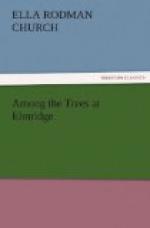“’How many are the uses of my bark! Thrifty men who sit beside the blazing hearth when my branches throw up a clear bright flame, and follow the example of their fathers in making their own shoes and those of their families, tan the hides with my bark. Kamschadales construct from it both hats and vessels for holding milk, and the Swedish fisherman his shoes. The Norwegian covers with it his low-roofed hut and spreads upon the surface layers of moss at least three or four inches thick, and, having twisted long strips together, he obtains excellent torches with which to cheer the darkness of his long nights. Fishermen, in like manner, make great use of them in alluring their finny prey. For this purpose they fit a portion of blazing birch in a cleft stick and spear the fish when attracted by its flickering light.’”
The children exclaimed at this queer way of fishing, but Malcolm was very much taken with the idea of doing it by night with blazing torches, and he thought that he would like to be a Norwegian fisherman even better than a hermit or an Indian.
“The old tree goes on to say,” continued Miss Harson, “that ’Finland mothers form of the dried leaves soft, elastic beds for their children, and from me is prepared the mona, their sole medicine in all diseases. My buds in spring exhale a delicious fragrance after showers, and the bark, when burnt, seems to purify the air in confined dwellings.’
“In Lapland the twigs of the birch, covered with reindeer-skins, are used for beds, but they cannot be so comfortable, I should think, as the leaves. The fragrant wood of the tree makes the fires which have to be kept up inside the huts even in summer to drive away the mosquitoes, and the people of those Northern regions would find it hard to get along without the useful birch.”
“I like to hear about it,” said Clara. “Can you tell us something more that is done with it, Miss Harson?”
“There is just one thing more,” replied her governess, with a smile, “which I will read out of an old book; and I desire you all to pay particular attention to it.”
Little Edith was wide awake again by this time, and her great blue eyes looked as if she were ready to devour every word.
“Birch rods,” continued Miss Harson, “are quite different from birch twigs, and the uses to which they were put were not altogether agreeable to the boys who ran away from school or did not get their lessons. ‘My branches,’ says the birch, ’gently waving in the wind, awakened in those days no feelings of dread with truant urchins—for all might be truants then, if so it pleased them—but at length a scribe arose who thus wrote concerning my ductile twigs: “The civil uses whereunto the birch serveth are many, as for the punishment of children both at home and abroad; for it hath an admirable influence upon them to quiet them when they wax unruly, and therefore some call the tree make-peace"’” Malcolm and Clara both laughed, and asked their young governess when the birch rods were coming; but Edith did not feel quite so easy, and, with her bruised foot and all, it took a great deal of petting that night to get her comfortably to bed.




